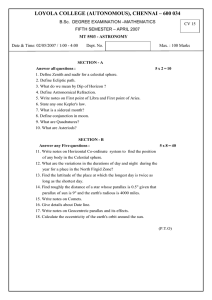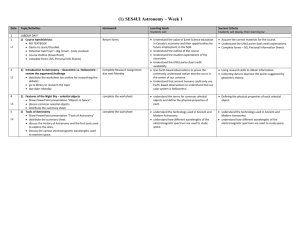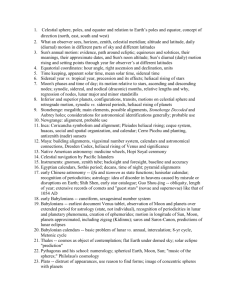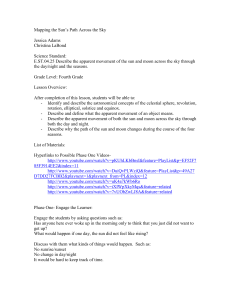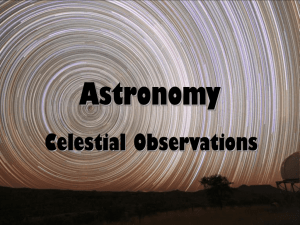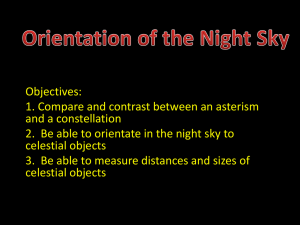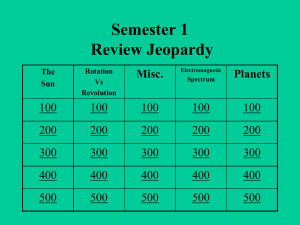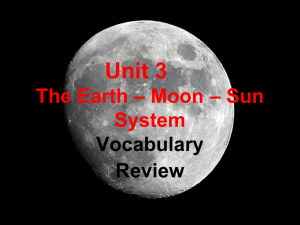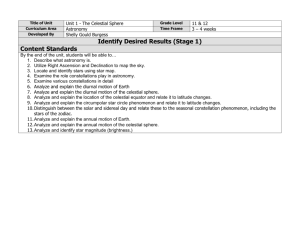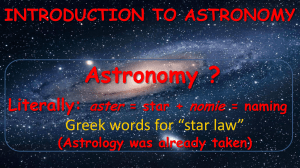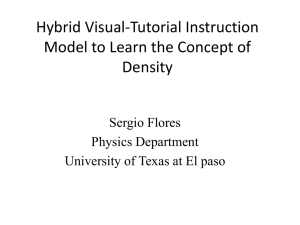Lesson 1-1 Slides Prehistoric Astronomy
advertisement
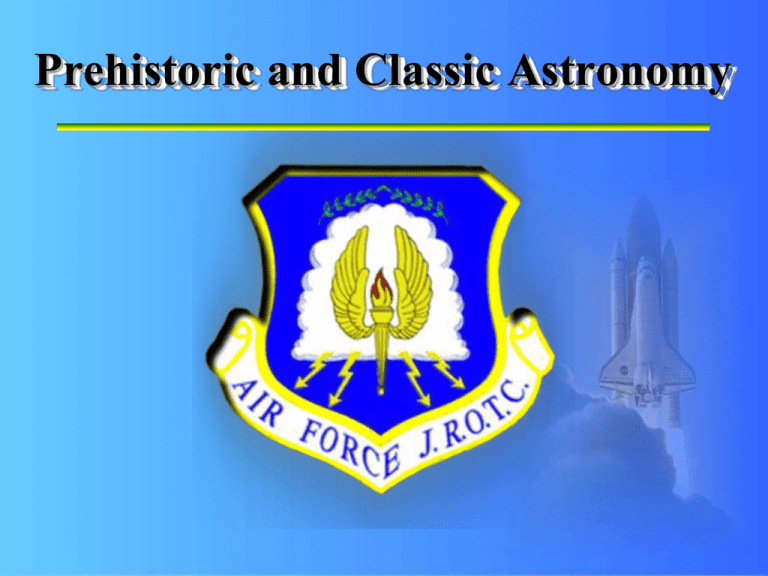
Prehistoric and Classic Astronomy Warm Up Questions CPS Questions (1-2) Chapter 1, Lesson 1 Chapter Overview Prehistoric and Classical Astronomy Astronomy and the Renaissance The Enlightenment and Modern Astronomy Chapter 1, Lesson 1 Lesson Overview Celestial Sphere Greek Earth-Centered Model Ptolemy’s Model Chapter 1, Lesson 1 Quick Write What does Eratosthenes’ experience in measuring the Earth tell you about what’s needed for scientific discoveries? (Note to teacher: Use “Pick a Student” button in CPS) Chapter 1, Lesson 1 The Celestial Sphere Celestial sphere refers to an imaginary sphere of heavenly objects that seems to center on the observer North Celestial Pole South Celestial Pole Constellation Courtesy of NOAO/AURA/ASF Chapter 1, Lesson 1 The Celestial Sphere It takes the Sun about 365.25 days to revolve around the celestial sphere The ecliptic is the name for the Sun’s apparent path among the stars around the Earth The zodiac is the group of constellations the Sun passes through on its apparent path along the ecliptic Chapter 1, Lesson 1 The Moon’s Phases The Moon does orbit the Earth Earth’s gravity holds the Moon in such a firm grip that it always keeps the same face turned toward the Earth Chapter 1, Lesson 1 The Moon’s Phases Chapter 1, Lesson 1 © J. Gatherum/ShutterStock, Inc. Observing Planetary Motion Retrograde Motion Planets move in elliptical, not circular orbits Revolve around the Sun, not Earth Chapter 1, Lesson 1 The Greek Earth-Centered Model Thales of Mileus Stars are not gods Pythagoras Spherical Earth Aristotle – 322 BC Placed the Earth at the center of things Parallax is the apparent shifting of nearby objects with respect to distant ones as the position of the observer changes Chapter 1, Lesson 1 Ptolemy’s Model Claudius Ptolemy – AD 150 Ptolemy believed that heavenly bodies (planets and stars) were perfect, in contrast to earthbound objects The universe was based on perfect circles An epicycle is the circular orbit of a planet, the center of which revolves around the Earth in another circle Chapter 1, Lesson 1 Evaluating Ptolemy’s Model Strengths Fits evidence available during his lifetime Includes testable predictions Weaknesses Assumed that Earth was stationary Theory of epicycles was a departure from simplicity and symmetry Chapter 1, Lesson 1 Learning Check CPS Questions (3-4) Chapter 1, Lesson 1 Activity 1: Astronomy Crossword Use your textbook to identify the terms and people of prehistoric and classical astronomy to complete the crossword puzzle. Refer to pages 6-18 in the textbook. Chapter 1, Lesson 1 Activity 2: Testing Parallax Follow the step-by-step directions on your worksheet in order to test the concept of parallax. Then answer the questions about parallax on the worksheet. Be prepared to share your answers with the class. Chapter 1, Lesson 1 Activity 3: The Moon’s Phases Work with your team to complete your worksheet on the Moon’s phases. You may refer to page 13 in the textbook. Chapter 1, Lesson 1 Technology Enrichment: Sky Maps & Constellations 1. Using the website link provided, download this month’s version and last month’s version of the Evening Sky Map for your geographic location. 2. Follow the steps and answer the questions on the worksheet. You may refer to pages 9-10 in your textbook. Chapter 1, Lesson 1 Review Celestial sphere refers to an imaginary sphere of heavenly objects that seems to center on the observer Earth’s gravity holds the Moon in such a firm grip that it always keeps the same face turned toward the Earth The ancient Greeks looked for symmetry, order, and unity in the cosmos Thales of Miletus reasoned that the Sun and other stars were not gods but balls of fire Chapter 1, Lesson 1 Review, cont. Pythagoras proposed that the Earth is spherical Aristotle placed the Earth at the center of things The Greek model of the universe that won the widest acceptance was that of Claudius Ptolemy; for 1,300 years, his model was the conventional wisdom of the scientific world Chapter 1, Lesson 1 Review Questions CPS Questions (5-6) Chapter 1, Lesson 1 Summary The Celestial Sphere Greek Earth-Centered Models Ptolemy’s Model Chapter 1, Lesson 1 Next… Done – Prehistoric and Classical Astronomy Next – Astronomy and the Renaissance Chapter 1, Lesson 1 © Photos.com
